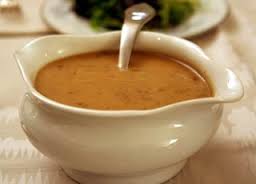
中文词源
gravy 肉汁
来自古法语grane, 沙司,炖汁,来自grain, 颗粒。即肉汁,形成颗粒条纹的汤汁。俚语义,美差。字母u, n拼写变化比较spouse, sponsor,同时在过去很长一段时间字母u,v拼写没有严格的区分。
英语词源
- gravy
-
gravy: [14] To begin with, the word gravy signified a sort of spiced stock-based sauce served with white meat; it was not until the 16th century that its modern sense ‘meat juices’ or ‘sauce made from them’ emerged. Its origins are problematical. It is generally agreed that its v represents a misreading of an n in the Old French word, grané, from which it was borrowed (modern v was written u in medieval manuscripts, and was often very hard to distinguish from n); but what the source of grané was is not clear.
The favourite candidate is perhaps grain (source of English grain), as if ‘sauce flavoured with grains of spice’, but graine ‘meat’ has also been suggested.
=> grain - gravy (n.)
- late 14c. (early 14c. in Anglo-French), from Old French grave, graue, apparently a misspelling of grané "sauce, stew," with -n- misread for -u- -- the character used for -v- in medial positions in words in medieval manuscripts. The French word probably originally meant "properly grained, seasoned," from Latin granum "grain, seed" (see grain (n.)). Meaning "money easily acquired" first attested 1910; gravy train (1909) originally was railroad slang for a short haul that paid well. Gravy-boat "small, deep dish for holding gravy or sauce" is from 1827.
权威例句
- 1. There was a smear of gravy on his chin.
- 他的下巴上粘着肉汁。
- 2. I always spatter my blouse with gravy when I eat.
- 吃饭的时候,我总是把肉汁溅到衬衣上。
- 3. Prepare the gravy mixture.
- 将肉汁混合料调好。
- 4. You have spilled gravy on the tablecloth.
- 你把肉汁泼到台布上了.
- 5. We were disgusted when bosses awarded themselves a massive pay rise. How can they get on the gravy train, but ask us to take a wage freeze?
- 看到老板为自己大幅加薪,我们感到十分气愤。他们凭什么轻轻松松捞油水却要求我们不涨工资?
